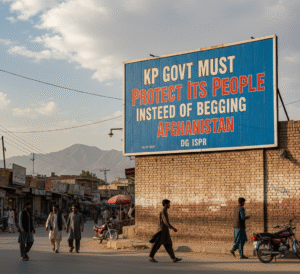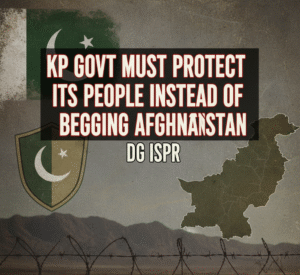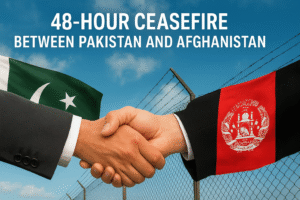KP Govt Must Protect Its People Instead of Begging Afghanistan: DG ISPR

Introduction
In a bold and clear message, Pakistan’s Director General of Inter-Services Public Relations (DG ISPR), Major General Ahmed Sharif Chaudhry, has called upon the Khyber Pakhtunkhwa (KP) government to take full responsibility for protecting its people rather than relying on Afghanistan for security guarantees.
This statement comes amid a fresh surge in terrorist activities across KP and Balochistan, many of which have been linked to militants operating from Afghan soil.
The DG ISPR’s remarks reflect growing frustration within Pakistan’s security establishment regarding Kabul’s failure to rein in the Tehrik-i-Taliban Pakistan (TTP) and other militant groups allegedly using Afghan territory to launch attacks inside Pakistan. KP Govt Must DG ISPR, security in Khyber Pakhtunkhwa, begging Afghanistan for security, NAP implementation KP, counterterrorism KP. KP Govt Must DG ISPR, security in Khyber Pakhtunkhwa, begging Afghanistan for security, NAP implementation KP, counterterrorism KP. KP Govt Must DG ISPR, security in Khyber Pakhtunkhwa, begging Afghanistan for security, NAP implementation KP, counterterrorism KP.

Background: The Security Crisis in KP
Rising Terrorist Attacks
Over the past year, KP has witnessed a sharp uptick in terrorist incidents, including attacks on police stations, army check posts, and civilian areas. The TTP and affiliated militant groups have claimed responsibility for many of these attacks.
According to official data, more than 400 terrorist incidents were reported in KP during 2025 alone, resulting in the deaths of hundreds of civilians and security personnel.
Border Challenges
The porous Pakistan-Afghanistan border—spanning over 2,600 kilometers—continues to be a major security concern. Despite the fencing project initiated by Pakistan’s military, infiltration and cross-border movement of militants remain a significant threat.
The Political Context
The DG ISPR’s statement comes amid political tension between the KP provincial government and the federal authorities. KP leaders have accused Islamabad of neglecting the province’s security needs, while federal officials argue that local governance and policing are provincial responsibilities under Pakistan’s constitution. KP Govt Must DG ISPR, security in Khyber Pakhtunkhwa, begging Afghanistan for security, NAP implementation KP, counterterrorism KP.
DG ISPR’s Press Conference: Key Highlights
During a detailed press briefing held at the ISPR headquarters, Maj Gen Ahmed Sharif Chaudhry addressed the growing security challenges in KP and along the Afghan border. His remarks were firm and unambiguous: KP Govt Must DG ISPR, security in Khyber Pakhtunkhwa, begging Afghanistan for security, NAP implementation KP, counterterrorism KP. KP Govt Must DG ISPR, security in Khyber Pakhtunkhwa, begging Afghanistan for security, NAP implementation KP, counterterrorism KP. KP Govt Must DG ISPR, security in Khyber Pakhtunkhwa, begging Afghanistan for security, NAP implementation KP, counterterrorism KP.
“The Khyber Pakhtunkhwa government must protect its people instead of begging Afghanistan for security. Ensuring law and order within the province is the responsibility of the elected leadership, not of a neighboring country.”
Key Points from the Statement:
-
Responsibility Lies with KP Govt
The DG ISPR stressed that provincial authorities must enhance coordination between law enforcement agencies and intelligence outfits. -
No Dependence on Afghanistan
He rejected the notion that Afghanistan could or should provide any form of security assurance to Pakistan, saying:“It is illogical and irresponsible to rely on a foreign government for the safety of Pakistani citizens.”
-
Pakistan Army’s Role
The DG ISPR reaffirmed that the Pakistan Army remains committed to defending the borders and supporting civil administration but cannot replace local governance structures. -
Counterterrorism Operations
He highlighted ongoing counterterrorism operations under Operation Azm-e-Istehkam, targeting militant hideouts in KP and Balochistan. -
Intelligence-Based Operations (IBOs)
The DG ISPR noted that over 3,000 IBOs have been conducted nationwide since January, neutralizing dozens of terrorist cells.
Pakistan-Afghanistan Tensions Over TTP
Kabul’s Role and Pakistan’s Concerns
Since the Taliban’s return to power in Kabul in 2021, Pakistan has repeatedly urged Afghan authorities to prevent the TTP from using Afghan territory to launch attacks.
However, Islamabad claims that the TTP continues to operate freely in eastern Afghanistan. KP Govt Must DG ISPR, security in Khyber Pakhtunkhwa, begging Afghanistan for security, NAP implementation KP, counterterrorism KP.
The DG ISPR criticized Kabul’s inaction, emphasizing that Pakistan’s patience is wearing thin:
“We have shared actionable intelligence with Afghan authorities numerous times, but the response has been inadequate. Terrorist sanctuaries still exist across the border.”
Diplomatic and Military Channels
Pakistan has pursued multiple channels—both diplomatic and security-based—to address this challenge. Regular meetings between Pakistan’s security officials and Afghan Taliban representatives have taken place, but tangible progress remains limited.
Impact on Civilians and Development in KP
The rise in violence has had devastating consequences for ordinary citizens in KP.
Daily life in many districts, including North Waziristan, Bajaur, and Tank, has been disrupted by curfews, raids, and targeted attacks.
Schools, healthcare facilities, and markets often face closures during heightened security operations, while development projects worth billions of rupees have been delayed.
Federal vs Provincial Responsibility Debate
The Constitutional Perspective
Under the 18th Amendment to Pakistan’s Constitution, law and order are provincial subjects. This means the KP government bears direct responsibility for policing and maintaining peace within the province.
However, given the magnitude of the threat, some experts argue that a joint federal-provincial counterterrorism framework is urgently needed.
Political Reactions
Leaders from opposition parties have endorsed the DG ISPR’s remarks, accusing the KP government of politicizing security issues for short-term political gain.
Meanwhile, the KP administration defended its position, claiming insufficient federal support in funding and intelligence sharing.
Pakistan Army’s Commitment to Border Security
The DG ISPR reiterated that the Pakistan Army continues to guard the frontier with Afghanistan and has taken several measures to strengthen surveillance:
-
Completion of 98% of the border fencing project
-
Deployment of additional security personnel along high-risk zones
-
Installation of modern monitoring systems and drones
-
Establishment of new frontier posts in key infiltration corridors
He added that while the military remains vigilant, long-term peace requires effective civilian governance, education, and economic reforms in tribal areas.
Public Sentiment and Social Media Reactions
Following the DG ISPR’s statement, social media platforms were flooded with reactions.
Many citizens praised the Army’s stance, calling for provincial accountability and better governance in KP.
Others questioned why federal and provincial leaders continue to trade blame while security personnel sacrifice their lives on the frontlines.
Prominent analysts and journalists highlighted that the DG ISPR’s remarks underscore a shifting narrative — one that demands political maturity and inter-institutional cooperation.
Regional Implications
Pakistan’s deteriorating ties with Afghanistan could have broader regional consequences.
Analysts warn that sustained border tensions may disrupt trade, undermine regional connectivity projects, and embolden militant networks.
The DG ISPR emphasized that Pakistan seeks peace and stability in the region but will not tolerate cross-border terrorism.

Counterterrorism Strategy: The Way Forward
The DG ISPR outlined Pakistan’s multi-pronged approach to restoring peace:
-
Strengthening Intelligence Coordination
Improved synergy between military and civil intelligence agencies. -
Enhancing Police Capacity
Training, modern equipment, and community policing models for KP’s law enforcement. -
Socioeconomic Uplift of Tribal Districts
Prioritizing job creation, education, and rehabilitation of displaced persons. -
Diplomatic Pressure on Kabul
Continued engagement through the foreign office and multilateral forums. -
Zero Tolerance Policy Against Terrorism
Uncompromising stance toward all groups targeting Pakistani citizens.
Expert Opinions
Security Analysts’ Views
Security experts agree that Pakistan’s internal coordination is as critical as its border security efforts.
They argue that a strong provincial response, coupled with intelligence-led operations, can significantly reduce terror incidents. KP Govt Must DG ISPR, security in Khyber Pakhtunkhwa, begging Afghanistan for security, NAP implementation KP, counterterrorism KP. KP Govt Must DG ISPR, security in Khyber Pakhtunkhwa, begging Afghanistan for security, NAP implementation KP, counterterrorism KP. KP Govt Must DG ISPR, security in Khyber Pakhtunkhwa, begging Afghanistan for security, NAP implementation KP, counterterrorism KP.
Former Diplomats’ Take
Former diplomats believe that Afghanistan’s reluctance to act decisively against the TTP stems from internal Taliban divisions, making Pakistan’s diplomatic approach more complex.
Conclusion
The DG ISPR’s message to the KP government was both direct and strategic. It highlighted the urgent need for provincial ownership of internal security while reaffirming the Pakistan Army’s unwavering commitment to national defense. KP Govt Must DG ISPR, security in Khyber Pakhtunkhwa, begging Afghanistan for security, NAP implementation KP, counterterrorism KPKP Govt Must DG ISPR, security in Khyber Pakhtunkhwa, begging Afghanistan for security, NAP implementation




